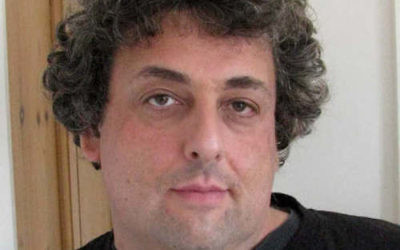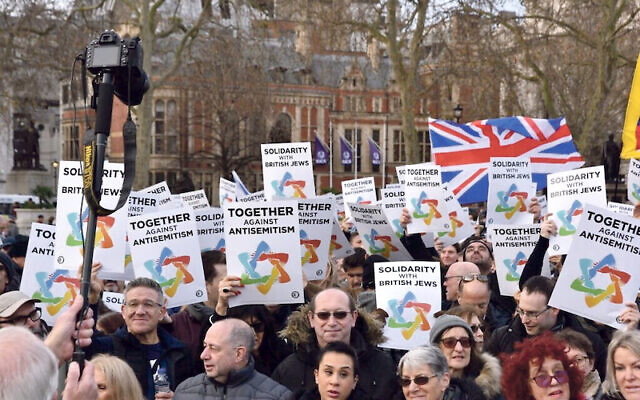OPINION: How you can help oppose antisemitism in academia
Lecturer David Hirsh on why he's launching the London Centre for the Study of Contemporary Antisemitism to lead academic research into contemporary antisemitism.
David teaches sociology at Goldsmiths, University of London. He's also the Editor of http://EngageOnline.org.uk .
Antisemitic thinking is routine in parts of the social and human sciences. Thousands of academics have signed statements affirming that Israel is uniquely apartheid, illegitimate, racist, should be boycotted and that these axioms are foundational to their scholarship and to their morality. It follows, then, that if you cannot sign up to them you are neither a scholar nor moral.
Although they do not say so as explicitly as their defrocked colleague Bristol sociology professor David Miller does, many academics think of their Jewish students and colleagues as ‘assets of Israel’. Hundreds of them, and indeed whole branches of their union, defended Miller, not only on the basis of academic freedom but on the basis of the eminence and value of his scholarship. They have not thought again, even now, when he is reduced to making clunky conspiracy theory videos for the Iranian propaganda machine.

For the overwhelming majority of Jews some kind of positive attachment to Israel is, in the formulation of lawyer and academic Anthony Julius, a “non-contingent and rationally intelligible aspect of their Jewish identity”. In any case, ‘Zionist’ in this context is not a self-ID concept. It is an identity that is thrust on us without our consent, and it means ‘racist’, ‘pro-imperialist’: a person who is not acceptable as a member of either the community of the good or the community of scholarship.
Antisemitic thinking of this kind is positively embraced by only a minority, but most academics either stay quiet in the face of it or they accept it as legitimate.
It is protected by those who have administrative power in our universities. But the work of describing and opposing it is not generally accepted as real scholarship; it is not protected, respected, rewarded or funded.
A first year student told me she had been warned that there was actually a “Zionist” inside the department! It is that picture of me that inspired the designation “far right white supremacist”. I am called that by our Students’ Union, which formally speaks for our students, and it is endorsed by my own union branch, which formally speaks for my colleagues.
I am a scholar of antisemitism, and of genocide, and of 20th century totalitrianism. I am the son of a refugee from Nazi Germany. Depending on who you count, tens, or hundreds, or thousands, or millions of my people were murdered by “far right white supremacists”. There is an antisemitic hostile environment at Goldsmiths. It has announced that it is going to carry out a formal investigation to determine whether that is true, and what should be done about it.
Danielle Greyman is suing Leeds University. Her lecturers failed her third-year essay because it did not blame Israel for what Hamas does wrong. The institution rallied round the markers. Her degree was delayed by a year. In the end, after legal pressure from UK Lawyers for Israel, the university conceded that the essay was not a fail. But the damage done to Danielle by that antisemitic exclusion is irreversible.
Holocaust and genocide studies is being reconstructed by people who say focus on the Holocaust is a Zionist strategy to legitimise Israel and to normalise colonial violence in general; their call is to ‘decentre’ the Holocaust.
SOAS paid out £15,000 to its student, Noah Lewis, to settle his complaint that there was an antisemitic hostile environment there. SOAS had asked me to chair his appeal. My appeal committee had mandated SOAS to have a proper inquiry to determine whether or not they have a problem of institutional antisemitism. I persistently reminded them of this and they ignored me. They never had an inquiry. When I spoke out in public they tried to undermine my professional reputation. They later withdrew the claims.
We need to institutionalise the work of challenging the intellectual underpinnings of antisemitism in public life.
We have played a role in shaping the responses of the Jewish community to 21st century antisemitic threats. But our position in universities is precarious and it is becoming increasingly difficult to teach and mentor the scholars of the future. We are cut out of research funding, academic publication and promotion. Even the very brightest young scholars of antisemitism are not getting jobs in universities.
We need to institutionalise the work of challenging the intellectual underpinnings of antisemitism in public life.
The new London Centre for the Study of Contemporary Antisemitism (LCSCA) is necessary to create a space where we can work. In collaboration with colleagues in other countries, we need to build an MA programme in antisemitism; we need a PhD programme; we need to fund and to lead academic research into contemporary antisemitism.
LCSCA is associated with the Journal of Contemporary Antisemitism and it has signed a deal with Routledge to publish a series of academic books on contemporary antisemitism.
Generations of successful Jews have donated money to build and sustain Jewish studies in universities, Holocaust and genocide studies, Israel studies and antisemitism studies.
Hannah Arendt wrote that “in a society on the whole hostile to Jews … it is possible to assimilate only by assimilating to antisemitism”. This is the situation that confronts academics even in these ostensibly safe spaces for Jews: assimilate to the wider hostile environment or risk exclusion from it. In polarised America, such exclusion is achieved by designating scholars who take contemporary antisemitism seriously as Trumpists.
It is becoming clear that much of the money that has been donated over the years is now being spent on people who do not have the conceptual tools or the intellectual clarity to understand and oppose antisemitism.
The task is nothing less than to change the intellectual weather and to turn around some powerful and enduring intellectual tendencies that have been building for decades; that threaten Jews, and that weaken the democratic state.
Our forthcoming launch event and conference are going to achieve something unique for an international meeting of academics: they will, at the same time, reach out to people in politics, the arts, public life; to the Jewish community; and to anti-antisemitism activists. The centre’s core business is research, and producing peer-reviewed research outputs, but it is keenly aware of the importance of that work having wider, practical impact.
This outreach is not one-way. LCSCA is making a virtue out of necessity. It is cut off from academic sources of support, publishing, and funding so it is building a community of people around it who feel that they are part of the work that the Centre is doing.
LCSCA will prove, by the success of its launch and conference, that it is in a position to lead a global network of scholars and to institutionalise the work that is now only done by individuals.
The institutions, and many individuals, of the Jewish community, and we ourselves, are ambitious for our new institution.
The task is nothing less than to change the intellectual weather and to turn around some powerful and enduring intellectual tendencies that have been building for decades; that threaten Jews, and that weaken the democratic state.
LCSCA is completely unsustainable without significant support. We need a minimum foundation on which we can build a self-sustaining and permanent institution.
We believe we need £250k a year for three years. We are asking the institutions and the individuals of the Jewish community, as well as wider communities of institutions and people who care about democracy, to help.

Thank you for helping to make Jewish News the leading source of news and opinion for the UK Jewish community. Today we're asking for your invaluable help to continue putting our community first in everything we do.
For as little as £5 a month you can help sustain the vital work we do in celebrating and standing up for Jewish life in Britain.
Jewish News holds our community together and keeps us connected. Like a synagogue, it’s where people turn to feel part of something bigger. It also proudly shows the rest of Britain the vibrancy and rich culture of modern Jewish life.
You can make a quick and easy one-off or monthly contribution of £5, £10, £20 or any other sum you’re comfortable with.
100% of your donation will help us continue celebrating our community, in all its dynamic diversity...
Engaging
Being a community platform means so much more than producing a newspaper and website. One of our proudest roles is media partnering with our invaluable charities to amplify the outstanding work they do to help us all.
Celebrating
There’s no shortage of oys in the world but Jewish News takes every opportunity to celebrate the joys too, through projects like Night of Heroes, 40 Under 40 and other compelling countdowns that make the community kvell with pride.
Pioneering
In the first collaboration between media outlets from different faiths, Jewish News worked with British Muslim TV and Church Times to produce a list of young activists leading the way on interfaith understanding.
Campaigning
Royal Mail issued a stamp honouring Holocaust hero Sir Nicholas Winton after a Jewish News campaign attracted more than 100,000 backers. Jewish Newsalso produces special editions of the paper highlighting pressing issues including mental health and Holocaust remembrance.
Easy access
In an age when news is readily accessible, Jewish News provides high-quality content free online and offline, removing any financial barriers to connecting people.
Voice of our community to wider society
The Jewish News team regularly appears on TV, radio and on the pages of the national press to comment on stories about the Jewish community. Easy access to the paper on the streets of London also means Jewish News provides an invaluable window into the community for the country at large.
We hope you agree all this is worth preserving.






















